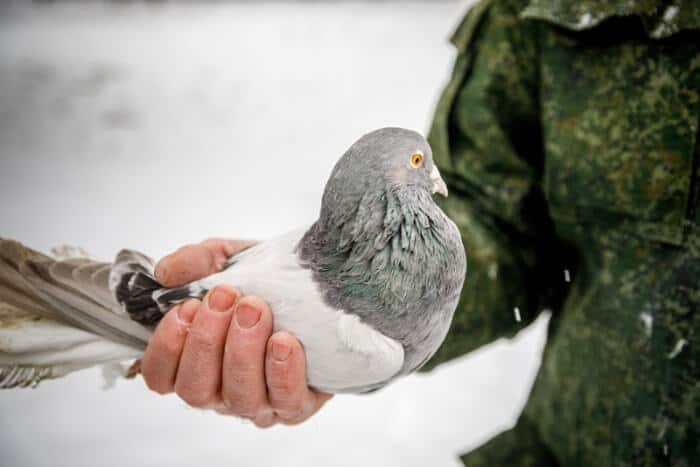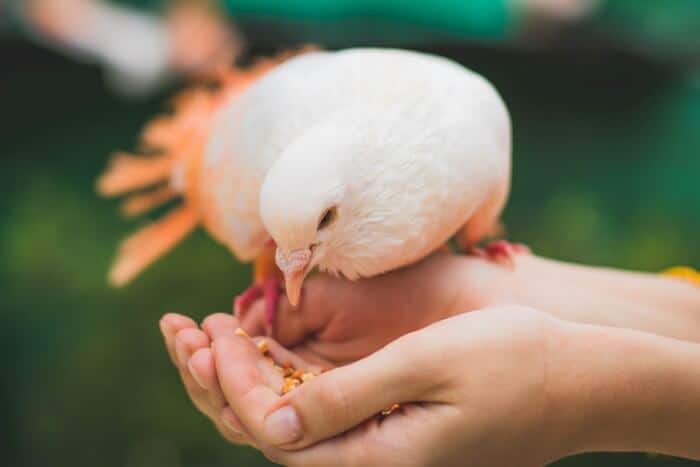It is estimated that there are 18 million feral pigeons in the UK.
That’s a lot of pigeons so it’s no wonder that we humans have regular contact with these birds – and not just in Trafalgar Square.

There may come a time when you have to get close and pick up a pigeon. But it’s tricky. Here’s how to catch a pigeon safely.
How to Catch a Pigeon in Your House (or any enclosed space)
You need to remain calm throughout the process. Stress will not enable you to focus on dealing with the bird in the safest manner for both yourself and the pigeon.
The best way is to encourage the bird to leave of its own accord. This is easiest when the bird is in a room with a window and a door. Open the window wide and pull back any window dressings (curtains or blinds) so the pigeon has easy access.
Leave the room and close the door. Wait until the pigeon has escaped to re-enter the room.
If however, you don’t have this option, you will need to catch the bird. This can’t be done while the bird is flapping around. Wait until the pigeon settles on a surface and then trap it. This can be done with any suitably sized receptacle.
The item used for the trap should be big enough to allow enough space around the bird so that you don’t damage its wings or bash its head when you capture it. Once you have trapped the pigeon, gently carry it outside and let it free.
How to Catch a Pigeon Outdoors
Catching a pigeon outdoors should be done in a humane way – especially if the pigeon is injured and you want to hand it over to an animal care facility – although this is an uncommon act as most people consider pigeons to be a pest and would rather just deter them altogether.
There are some that say you can catch a pigeon with your bare hands. This is probably only possible if the bird has limited mobility and is unable to fly away.
Catch a pigeon by hand

With a confident touch, take hold of the bird from above, placing both hands round the body, encasing the wings. One hand should support the pigeon’s breast while the other should be over the beginning of the tail, holding the wings closed. Preferably the bird should face you.
Catch a pigeon with a net
If you are going to use a net, it should be one with a fine mesh to avoid the bird’s feet and beak becoming entangled. It is also preferable that the net has a padded rim. Pet supply shops may carry special bird nets. Do not try to catch a flying bird with a net. Wait until it has landed.
The best ways to catch a pigeon outdoors is to lure it with food. The easiest and least fussy way is by baiting a cage trap with food. This is not an instant solution. The pigeon needs to learn that food will be available in the same place regularly.
If you have a regular flock of pigeons to whom you can get close to, you might capture a pigeon by laying down some food and simply picking up the one you want when it is feeding.
You can also throw a lightweight fabric item over it to prevent it flying away, enabling you to pick it up.
How to Catch a Homing Pigeon
A homing pigeon cannot be referred to in any way as a pest; indeed some owners or homing pigeons treat them as pets, as do owners of racing pigeons.
A homing or racing pigeon is easily identifiable because it has a ring around one leg.
Racing pigeons will sometimes break their journey, coming down to the ground for a rest. If you want to give the bird a pit stop, provide food and water. Do not feed them bread.
If you don’t have pigeon food or seeds, crushed cornflakes are a good option. Do not leave food and water around for more than 48 hours to encourage the pigeon to continue its journey.
The bird will usually continue on its way but if it doesn’t, catch the pigeon and contact the owner.
The details are contained in the leg ring. If you see that the pigeon is injured, catch it and contact the owner immediately. If the ring does not contain owner details, contact the Royal Pigeon Racing Association.
Homing and racing pigeons are more used to being handled than wild pigeons who are not used to being petted. Use a lightweight fabric item to throw over the bird if you’re not confident of trapping it with your hands.
You’ve Caught a Pigeon – Now What?
As already mentioned, dealing with a racing or homing pigeon is usually a straightforward process: either contact the owner or the RPRA. You can also take the pigeon to the vet who will take over the responsibility of tracing the owner.
It is more difficult with wild pigeons. You can ring the RSPCA 24-hour cruelty and advice line, but the response will be varied. Operators will either be responsive and advise you to take it to your local vet or they will be indifferent because they will see the pigeon as vermin.
Here is what to do if you find an injured pigeon.
Why Would You Want to Catch a Pigeon?
In most cases, the reason to catch a pigeon will somewhat dictate the method you use to capture it.
There’s a difference between a pigeon who has managed to find its way into your home and one that is sick/dying, has been injured, or is in danger.
You might imagine there is a moral question here. Many consider pigeons to be vermin and therefore why would you attempt to help a pigeon that is sick or dying.
Obviously, the case is different if it’s a homing pigeon or a racing pigeon, but then the situation is much more personal to the pigeon’s owner.
Whatever the moral stance, you should be able to recognize the signs that a pigeon is merely in distress because of the confined space they’ve gotten into and the signs a bird is sick or dying.
A confined pigeon will flap about a lot, hopping from surface to surface, trying to find its way out. It may defecate due to stress. It may even dive-bomb you in its fear and frantic attempts to escape.
The signs of a sick, injured, or dying pigeon are:
- Difficulty in flying
- Very little movement
- Overly fluffed or matted/dirty feathers
- Visible wounds or lesions
- Rapid breathing
- Drooping wings
- Tilted head
- Limping
- Swollen or dull eyes
- Excessive drinking
Whether you choose to catch a pigeon, is a matter of conscience and choice, but if you do, be as humane in the process as you can.
